#or were they tatars in this
Explore tagged Tumblr posts
Text




@asiandramanet creator bingo - free choice
The Trust (2023) — I want to meet the Emperor who drank with me in the North. Although you have the same face, I know you are not her.
#asiandramanet#cdramasource#the trust#xu yu#tatar huna#i went from “cannot believe i'm watching this” to “i need other people to watch this” so quick#anyway please have: one of the many extremely shippable f/f pairs#like what were we supposed to do with this???#(if you have not seen this: this is a bodyswap show. huna is fighting the same person both times. this is how she recognizes her.)#my gifs
31 notes
·
View notes
Text
idk i love and respect and adore my ukrainian friends who are fighting against russian occupation and ethnic cleansing, but i guess that i do wish that ukrainian academics who are correctly protesting against russia would focus on russia's history with ukraine. they're doing a thing where they're like, bringing to light every single ancient wrong that russia has done to any non ethnically russian slav, and...
idk i've heard a lot of people take issue with it. my personal thing is that it's weird and dehumanizing to have the genocide of my people only matter and be appropriated in a "russia bad" campaign. if anyone talks about it, i want it to be with people who actually care about circassians, not just doing a kind of ... like... modern day orientalist painting.
#like not even getting into the degree to which any of these ukrainians who are talking on this#we BOTH know the history between circassians and ukrainian cossacks and crimean tatars#circassians and ukrianians at that time were not exactly happy allies to say the least#that continued through world war 2#circassians now ride HARD for ukraine but that doesn't like ... entitle ukrainians to claim the circassian genocide ? idk dude#we both know the role that ukrainians played in that
5 notes
·
View notes
Text
Ah yes, Magnificent Century, or as I like to call it – “Why the fuck are the most likely Ukrainian girl and the Crimean Tatar woman speaking Russian to each other, what were the writers smoking???”
#BEFORE ANYBODY COMES AT ME#DO NOT use this post to debate hürrem’s nationality. please#most people agree she was from an area which is modern day ukraine. can we please leave it at that#also yes they were speaking Russian in that scene. not Ukrainian like I’ve seen some people say#trust me I know and can tell the difference between the two. it’s Russian#okay? okay#now that that’s out of the way#what is this. the 1500s or the Soviet Union??#for the record at this point in the show timeline there’s still another 32 years until Ivan the terrible conquers Kazan#a.k.a the Tatar capital#and ukraine was not a part of Russia at that point either#though I cannot tell you exactly who it belonged to bc I erased most of what I learned in history after my exam#but the point is#there is a very. very small chance that both of the would have known Russian#especially fluently#I feel like I’m swinging at a wasp’s nest by making this post so again#please don’t start any discourse#I am just trying to make a joke about the Taylan brothers failing both history and geography#alright?#okay good#Nia rewatches MC#magnificent century#muhteşem yüzyıl#hürrem sultan#valide sultan
5 notes
·
View notes
Text
I'm actually interested in why people draw Liet with giant eyebrows. I mean- they're all Baltics, they're mostly blonde with giant baby cow eyes and wavy hair... unless he's Lipka Tatar, but they mostly live in Belarus and Poland nowadays?
#I have giant eyebrows because I'm Ukrainian - and let me tell you most of time they look pretty scary#and every time i try to use eyebrows pencil I look like goddamn brezhnev#I am 90% sure some of my ancestors were Tatars or someone because damn. not even Ukrainians have such thick eyes#i kinda hoped fashion on thick eyebrows would disappear and it did. because damn guys why do you hate your beautiful thin eyebrows so much
11 notes
·
View notes
Text
fuck it it's fallout vipers but they're inspired by northeast asia shamanism time
#fallout#fallout new vegas#fallout van buren#fallout vipers#perso#man i can't stop headcanoning the people who founded vipers were originally immigrants from northeastern eurasia#like for some reason i don't see vipers as native american shamans... more like yakut/mongolian shamans#they kinda have that bit of tengrism vibe yk#ngl while i was putting together this playlist i couldn't help but think about my tatar father.. he was so obsessed with siberian shamanism#probably got it from my grandma lol
4 notes
·
View notes
Note
if you read anna louise strong i think it becomes clear that ussr acted according to pre-war established pattern when it came to security risks:
The common sentence was not execution, but swift removal to another job in another part of the country. Fairly large numbers of such transfers seemed to have occurred merely on suspicion, on the theory that if the suspects were guilty, or had guilty connections, the transfer would break these up [...].
Regarding your post on Stalin and Lenin, I want to ask in good faith: how can honest Communists, in good conscience, acknowledge the material harm and the death tolls of the deportations of the Crimean Tatars, Soviet Koreans, and Chechens + Ingush carried out by Stalin's administration?
I at least understand why Marxist-Leninists dispute calling the Holodomor and Kazakh famines genocides, on the grounds that they came about as a mix of failed policy, bad weather, and unintended consequences.
However, while Stalin's influence on the Famines is debatable, allowing the deportations to be carried out (which DO constitute a genocide) must certainly fall on his head. This is doubly so because Lavrentiy Beria - the principal architect of the Crimean Tatar and Chechen deportations - was a close ally of Stalin.
A big reason I ask this is because I frequently see other communists either gloss over the material harm of these deportations, or treat them as a regrettable footnote in an otherwise proud career. I find both approaches problematic, because I do not see them as an honest assessment of Stalin's wrongdoing with regards to ethnic minorities within the Soviet Union.
I thank you for your time, and I look forward to reading your assessment, should you chose to answer it. Have a good day.
[context]
I'll get to the ask itself in a moment, but first I want to point out how you're doing exactly what the post you're replying to is criticizing, how every mistake and imperfect policy of the USSR between 1924 and 1953 is scapegoated to Stalin. You're ignoring both the very important structures of democracy and accountability within the party as well as in the administration of the state. He wasn't a dictator and policy was not a direct extension of the man's thoughts. The party leadership was a collective organ made up of at least a dozen people, of which Stalin was simply the chairman, with the same vote as everyone else. And every single one of these members were beholden to democratic recall at any time.
Let's start on the common ground, we understand that the famine which struck Ukraine, southern Russia and western Kazakhstan in the early 1930s has a context of cyclical famines, grain hoarding, rushed collectivization, and bad weather. There has been a strong effort on the part of capitalist powers to both exaggerate the effects of the famine and to place it all with intent to exterminate Ukranians specifically. The policy of collectivization and antagonism towards the grain-hoarding rich peasants was one approved by and carried out by hundreds of thousands of people, if not millions. We can debate the degree of maliciousness, the severity of its effects, etc. But what is indisputable once you know just a little of how the USSR worked, to pretend that it could all be carried out by Stalin's sole will is absurd.
And what is the context of the deportations? The fascist invasion of the USSR. This is an extraordinary circumstance, every facet of the USSR was being attacked and threatened with sabotage. It wasn't even the first time they had had to deal with internal sabotage, like it was revealed in the trials following the assassination of Kirov. Throughout the 30s, Nazi Germany's strongarm diplomacy was practically enabled by their ability to create fifth columns, to instigate conflict and to infiltrate. They were in the process of setting up a coup d'etat in Lithuania when, with only a week to spare, it was voted that Lithuania would join the USSR. So, the fear that, as the front advanced, the nazis would do everything in their power to turn the tapestry of nationalities close to the front against the USSR, wasn't only unfounded, it was certain. Fascists are also quite famously brutal against the minorities in the territories they conquered. Their modus operandi whenever they captured a population was to kill any elected leaders and start to instigate anti-semitism.
This was the rationale that drove the policy of resettlement. It was a rushed wartime decision, such was the context, and people definitely died unnecessarily in transport. They decided that the negative consequences of resettlement outweighed the risk of sabotage, destroyed supply lines, and of a completely certain brutal destiny for these minorities if the front advanced past them. It was not a genocide, and it had nothing to do with whatever personal relationship you think Stalin had with Beria. (As a tangent, in this interview, Stalin's bodyguard said that Beria was "neither his [Stalin's] right hand man or left hand man"). I reiterate though, the personal relationships of one man did not dictate the policy decided on democratically by the CPSU.
I don't see the problem in understanding the context of these decisions and understanding the rationale behind them without kneejerking into discounting Stalin's competency. It's very easy to criticize a decision with 80 years of hindsight, without the pressure of the largest land invasion ever carried out advancing steadily. You can't understand the policies of a country containing hundreds of millions of people and hundreds of nationalities through the lens of a single man's personal failings, especially in wartime. Admitting these mistakes, but understanding the context in which they were made, is the only way to learn from other attempts at developing socialism. What is not productive is to insist on pinning every mistake, every unnecessary pain, every inefficiency, as the wrongdoings of a single man. It's dishonest to both the past, and to how communists organize today.
#crimean tatars had high record of nazi collaboration which enabled the decision#also curious how anon didn't mention volga germans who were also deported away from frontlines#doesn't take the genius to guess why it happened. after czechoslovakian ethnic germans enthusiastically enabled the occupation.#ussr didn't want to temp the fate lol#and look what czechs did to those local germans after war. imagine the societal scrutiny volga germans would have been after war#if they were not relocated
114 notes
·
View notes
Text
by this point in my mind lol when i think about it the tatars arent even like "mongol invaders" or whatever they were basically our cousins and relatives coming over to us and being like oh lol hello again long time no see since you migrated! time to do to you what you did when you first got to the balkans!
same practice of wartime slave capture, same early culture. hell the fact that we got bridal kidnappings from them when we met again may as well have been a cultural reunion, though who knows, maybe they were doing it even before. not like theres anything written about it
#romanians: want to claim glory from roman heritage#me: hey you know how the dacians were called like asiatic invadors. yea thats where im drawing my history from#this is funnier bc im actually mixed tatar on both sides but still like#foreign invadors? try long lost relative more like
0 notes
Text
Update on the situation today
Thu, 16 Jan
After the ceasefire was announced here in Gaza as we saw in all the news agencies, joy and hope filled our souls again 🫂🙏
But unfortunately it was a tough night for us due to the intensification of the raids on our area.
We had started sleeping at 10:30 pm, but we woke up to the sound of the violent fire belt that shook the area, the house and the walls.
When I heard the sound, I don't know how I controlled myself and my nerves to protect my son Tim from the severity of the blow, as the huge windows of the house collapsed on us, and I don't know how I was able to pull Tim from under the large windows, but unfortunately his eye was injured and he started crying and screaming 😭😭
Imagine with me how a five-year-old child wakes up to this panic while he was sleeping and he was sharing the atmosphere of joy with us at the completion of the deal and he was saying to me: Mom, I want you to dress me in Eid clothes, it's over because the war is over 🥲🧸
This is the treacherous Tatar army that surprised us.
I've had enough of this nonsense and my heart no longer has the patience to see me and my family's tragedy, panic and fear of who I will lose!!
I will not get tired and I will not get bored of asking you for help. It's true that I was shy, but it's my right and the right of my child and my family to live in peace.
I don't want all of this to accompany me for life and I don't want these memories to be the only ones in my son's mind!! I won't put myself in anyone's shoes, but if I could help someone or a family, I would do what I can 🙏
Here we are on the verge of opening the crossing in the coming days and I haven't even reached the minimum donations that would allow me to travel to survive Each one of us needs about $5000 to get us to safety, we are now staying at a friends house and when the war is over they will go back to their house and we will go back to the street again, unless you help us with donations to get out of here
Remember well, I have no housing or anything left!!
My only chance for me, my child, and my family consisting of my son, husband, mother, father, and brothers is to travel because all our belongings were completely destroyed.
And your prayers for my child's recovery 🙏🧸 And please support my campaign and share it with your friends.


#gaza gofundme#donations#north gaza#tumblr fyp#gaza genocide#free gaza#gazaunderattack#save gaza#help gaza#gaza fundraiser#gaza gfm#free palestine#save palestine#i stand with palestine
803 notes
·
View notes
Text
learning the culture of a language that one wants to learn is important. i'll die on that hill.
#балаболим#have found a tatar language learnbook that had texts of the tatar authors in it and Felt Something.#like. if they were teaching us in the university that it's important then it's important. and reading in the language is important too#and learning the culture. it's important.#not awake enough to say better. but o just wanted to say it. it is so important and helps so much both with the language and in general#like. worldview. personal understanding of the world and just. learning the culture of the other. woahg#sorry. rambling. tonight)))#brain scrambled egg. felt something today and wanted to share i suppose)#even if i forgot most of the language stuff i've learned in the uni this stuck to me. i'm glad it did.
1 note
·
View note
Text
Today is the remembrance day for all the Jewish people of Crimea that were killed during WW2. According to the 1939 census, there were 65 452 Jewish people living in Crimea, among whom there were probably more than 7000 Krymchaks. Krymchaks are a separate ethnolinguistic community of the Jewish population, who speak the Crimean Tatar language and are one of the indigenous people of Crimea. Records state about 40 000 victims among Jews and Krymchaks during WW2. Researchers state that the Nazis killed about 80% of the Krymchaks from their pre-war number. The loss of the main part of the ethnic community had irreversible consequences. Among the exterminated were almost all representatives of the older age group - the keepers and bearers of traditions, language and culture.
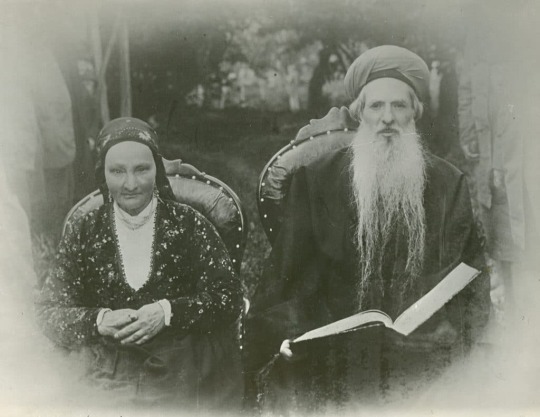
608 notes
·
View notes
Text
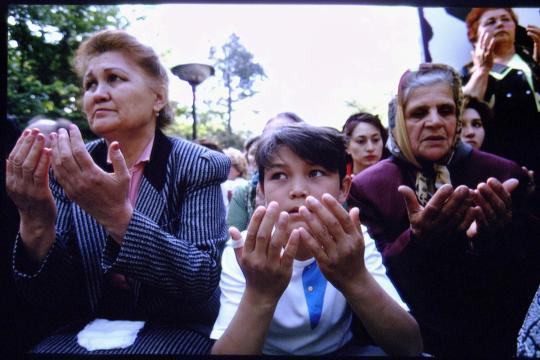
1994: Crimean Tatars mark the 50th anniversary of russia deporting their entire population from their homeland. From the 18th-20th of May 1944 the Tatars were loaded onto cattle trains and removed from their native land.
2024 is the 80th anniversary of Stalin's Crimean genocide.
Since 2014 Crimea has again been occupied by russia.
#settler colonialism#vintage ukraine#ukrainian history#colonialim#russia#imperialism#on this day#crimea#crimean tatars#communism#stalin#putin#ethnic cleansing#genocide#soviet union#russian history#communist
598 notes
·
View notes
Text

THE SUDRA
The sudra is a traditional Jewish headdress with a history dating back thousands of years to the Biblical period and ancient Mesopotamia. It was worn like a turban or a headscarf and was of great spiritual importance at various points throughout history; for example, it’s mentioned directly in the Babylonian Talmud (written between the years 500-700). There are also some likely references to it in the Tanakh, such as in Exodus and the Book of Ruth.
CUSTOMS
Beyond spiritual significance, the Babylonian Talmud describes how it is customary to let another man hold one’s sudra as a gesture of trust during a monetary transaction.
In the Shulchan Aruch, there is an exemption for the sudra regarding the use of tzitzit. Even though the sudra is a four-cornered garment, tzitzit aren’t required.
Among Sepharadim, the sudra was worn over the shoulders like a scarf, while Ashkenazim wore it “coiled round the body like an Egyptian snake” or like the “kaftanis of the Tatars” when worn on the head. In fact, the sudra is likely the predecessor of the shtreimel (the fur hat worn by some Ashkenazi Jewish men), as Ashkenazi Jews in Europe eventually replaced the scarf with more weather-appropriate fur.
SUDRA IS OUTLAWED
With the expansion of the Arab and Islamic empires starting in 632 CE, Jews became “dhimmis,” relegated to second class citizenship and a whole host of prohibitions. Among those prohibitions was the use of the sudra. For example, in Yemen in 1667, the Jewish sudra was banned, likely to humiliate the Jewish community by forcing them to place regular clothes on their heads. The Jewish community bribed some government officials to reverse the decision. Ultimately a deal was struck where Jews were permitted to wear the sudra so long as it was made of bad quality cloth.
As the Arab keffiyeh became associated with Arab Muslims of high status, Arab rulers once again instituted prohibitions on the Jewish sudra because it was too similar to the keffiyeh.
DECLINE AMONG ASHKENAZIM
Jews in Europe still used the traditional sudra well into the 16th century, some 1500 years after their exile from Judea (Israel-Palestine today). In the Shulchan Aruch, Rabbi Moses Isserles specifically mentioned the significance of the sudra among Ashkenazim.
In the Middle Ages, the use of turbans such as sudras were outlawed in Europe, resulting in the gradual decline of the sudra among Ashkenazi Jewry. Eventually the sudra evolved into other forms of “legal” and weather-appropriate dress, such as the shtreimel, as discussed previously.
DECOLONIZATION OR APPROPRIATION?
Among other things decolonization is the process of removing the layers of oppressive foreign imperial and colonial influence imposed upon one’s culture. As discussed, Jews have worn the sudra since ancient times, dating back thousands of years. The garment came into disuse due to the oppressive laws of powerful empires, both in Southwest Asia/North Africa and among Jews in Europe. Reclaiming the sudra, which also happens to be of great spiritual significance, is an act of decolonization.
The keffiyeh, which uses a similar pattern, became a symbol of Palestinian nationalism and resistance in the 1930s (after longtime use among Palestinian farmers and others in Arab nations). Kurds, Persians, Yazidis, and other Indigenous Southwest Asian groups also traditionally use keffiyehs. In fact, the keffiyeh and the sudra likely have the same origin; that said, the sudra predates the keffiyeh by hundreds of years.
The Jewish reclamation of the sudra should not be weaponized to harm Palestinians. That said, claiming that Jews are “appropriating” keffiyehs while using the sudra is absurd, seeing as the sudra not only came before the keffiyeh, but is also a garment of spiritual significance for Jews that was still used relatively recently in the scope of Jewish history. Ultimately, we have to remember that Jews and Palestinians are historic, cultural, and ethnic cousins, and, as such, some parts of our cultures will overlap.
#jumblr#jewblr#jewish tumblr#judaism#jewish#jewish history#funkowrites#antisemitism#rootsmetals#stop antisemitism
182 notes
·
View notes
Text
References in 1670 (Updated)
General info
Names
Jan Paweł - is a reference to a pope, Jan Paweł II. He's considered "the greatest polish person", up to a comical point. So he turned into a meme.
Jakub - A reference to a saying "Do unto others as you would have them do unto you". In polish "Jak Kuba bogu tak bóg Kubie". Literally "As Kuba to god, god to Kuba".
Jędrula - A reference to a show about Foster family, to a character that liked to drink whiskey.
Andrzej - A stereotypical neighbour, where he has everything better than you.
Żmija - A reference to Ojciec Mateusz, a show about a priest solving crime, played by Artur Żmijewski (hence the name). Żmija is from Sandomierz, that's where Ojciec Mateusz was set. (From multiple people, @rabarbarzcukrem mainly.)
Historical background
Poland was going into a sort of a recession. It used to be one of the most powerful countries in Europe. As well as Lithuania, of course. Time of the Commonwealth. The plague didn't hit the Commonwealth as much because it wasn't densily populated. The biggest issue (one of many) were the tatars, who just kind of lived there. Usually were bribed into gaining some power in the country so they won't couse trouble. Lithuania was getting Polonised, but it wasn't going as good as you could imagine. It's the time after the swedish flood, where the whole country was basically looted. It was considered a very open country, many Jews lived here.
Liberum Veto - it's just that one person can say no and whatever they voted on, won't pass. Also huge reason why partations later happened.
Culture
Drowning of Marzanna is a ritual that happens every year, on the first day of spring, to say goodbye to winter. Marzanna is a slavic goddess associeted with death, winter and nature. Marzanna is sometimes set on fire and then thrown into a river. + Interesting tags from @ukulelegodparent (From multiple people)

Hunting by nobles was also kinda a cultural thing. It was often described in the books from that time.
References
"Ała kurwa rzeczywiście" - reference to this
youtube
"Quo Vadis" - meaning, "Where are you going?", is a reference to novel by Henry SIenkiewicz. More known overseas from a movie adaptation from 1951. (From multiple people)
"My wife, Zofia" is a reference to a movie "Miś". (From @gdzie-rosna-poziomki)
youtube
"Do dupy z takim spiskowcem. Mnie kury szczać prowadzić, a nie spiski" is a reference to Piłsudski's "Wam kury szczać prowadzić, a nie politykę robić. (From @gdzie-rosna-poziomki)
"Ta zniewaga... oczekuje, abym ją wymazał stosując przemoc." - "This insult... expects me to earase it with violance." Reference to "Zemsta", by Aleksander Fredro, "Ta zniewaga krwi wymaga." - "This insult requires blood spill". (From @rabarbarzcukrem)
Measuring tassels - likely a reference to "Pan Tadeusz". In modern speach, tassels means dicks. (Also from @rabarbarzcukrem)
Jan Paweł walking on Zofia and Rozalia in bed, the deer antlers look like they're growing from his head. It's a reference to a saying "przyprawić komuś rogi" (also in use in multiple other languages). Which means to cheat on someone. (Multiple people, mainly @rabarbarzcukrem)
Equality march - It's how Pride Prades are called in Poland. (From @rabarbarzcukrem)
Henry kicking a fern flower is a reference to Slavic mythology. It symbolizes ferility and love. (Also from @rabarbarzcukrem) @misticfog adds to it here. (And some other things)
Stasia the mouner saying "Wszystkie kary na mnie idą" ("All punishments come to me") is a reference to this: (from @00midnightrider00)
youtube
(Quote happens in 1:20)
Thank you for all the additions!
Lorem Ipsum - is a placeholder text often used in web page design.
"Koń jaki jest, każdy widzi" - What a horse is everyone sees, is a reference to the first polish dictionary.
590 notes
·
View notes
Text
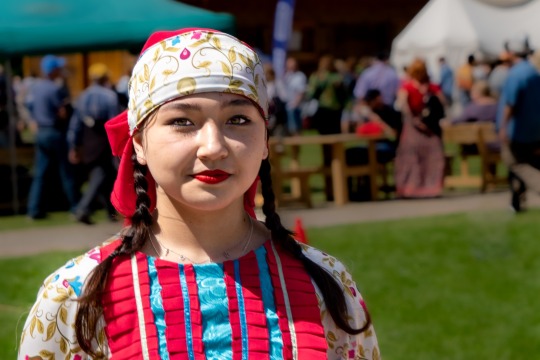
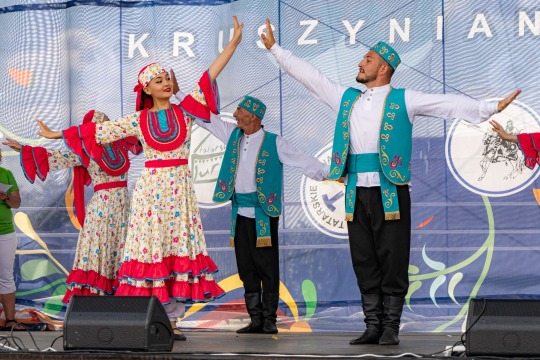
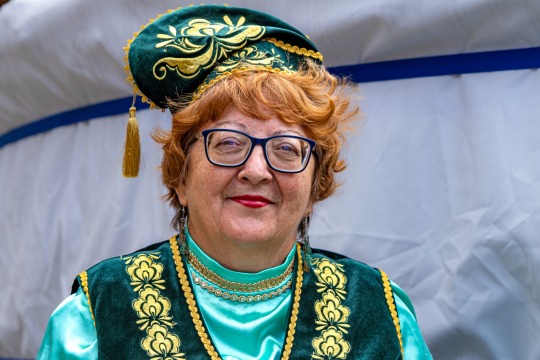
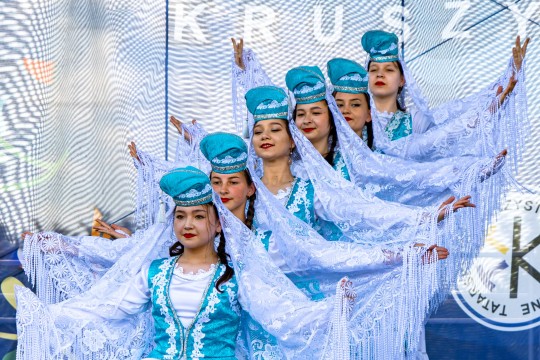
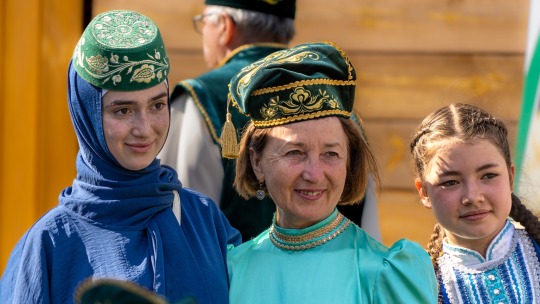
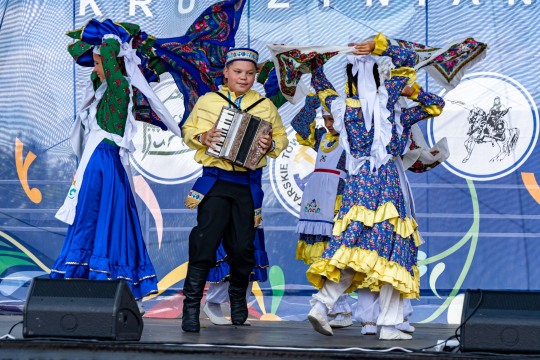
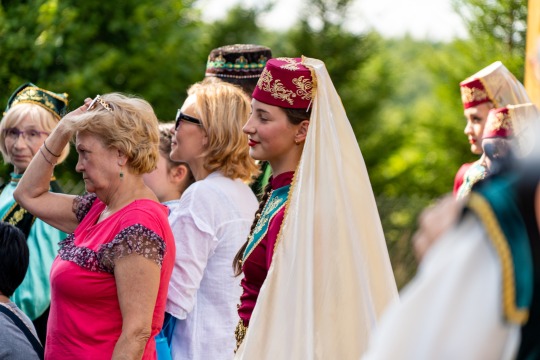
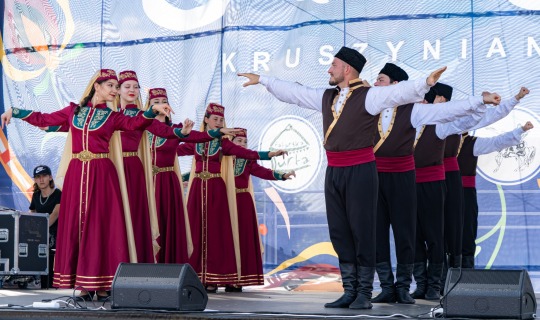
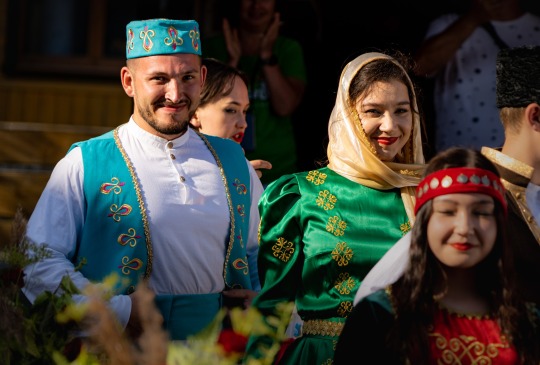
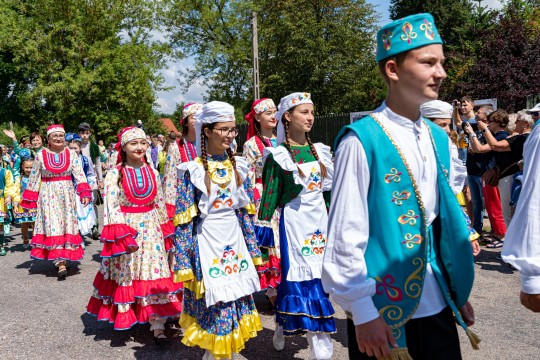
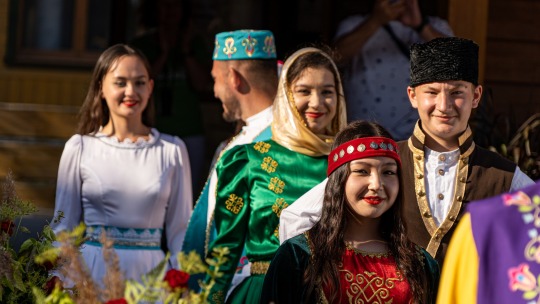
Poland's Muslim Lipka Tatars
Lipka Tatars are Poland's only remaining Indigenous Islamic group. Many of the Polish Tatars belonged to the Polish nobility historically and through out history have been one of the most loyal groups to the Polish state; also having had an influence on the general Polish culture.
Noted for their skills in archery and horse riding, they have been viewed as some of Poland's greatest warriors in the past. Their combat was essential in Poland's victory over the Ottoman Empire during the Battle of Vienna. This fact is contrary to recent western nationalist propaganda, stating that the war was a battle between Christendom and the Islamic world, rather than a war of imperialism. After the war King Jan Sobieski III granted the Lipka Tatars large pieces of land in the Podlasie region of Eastern Poland.
Their origins are in predominately male Crimean Tatars and other settlers from the Golden Horde, who relied on intermarriage with Christian women, leading to early partial assimilation and adoption of Slavic languages. However, they were able to keep their identity and parts of their culture through their ties to Islam. Regardless, over the centuries more and more Tatars were absorbed into the Polish-Lithuanian Common wealth's Catholic and Orthodox populations, with estimates in the 18th century stating that up to 25% of Muslims converted to Christianity- partially motivated by violent peasant drawback due to the privileges bestowed onto them. Eventually this absorption reached its height during the inter-war and post-World War II period of Poland, in part due to assimilative policies. These days most Lipka Tatar descedants simply identify as ethnic Poles, with many Poles not aware of their ancestry. A prominent example of this is Polish-American personality Martha Stewart who only recently discovered that she is of partial Lipka Tatar ancestry, after partaking in a television program dedicated to geneaology.
160 notes
·
View notes
Text
do people understand that crimea is only so heavily russian because russia ethnically cleansed the region of the indigenous tatars over like two/three centuries, and even though they were granted right of return in 1989 by the soviets they still only make up like 15% of the crimea population, so frankly any majority opinion over what the crimeans want that doesn't take into account what the tatars want is actually just a symptom of russian imperialism?
oh but I'm sure then these same idiots will claim that because russia doesn't consider them indigenous that they aren't indigenous, even though the tatars have been the people in crimea since ethnogenesis, are now and have historically been marginalized by both russia and ukraine, have connections to the land and distinct culture as well as a governing body.
so no actually it isn't right for ukraine to just give up crimea even though the majority of the region wants to be annexed by russia because that majority was settled there in order to displace the tatars.
now ultimately if the tatars want independence they should absolutely have that, and if the russian majority has a problem with that, they can go back to russia. this is what these folks would say in any other case. and they'd be right - the self-determination of the indigenous people of a region trumps the comfort of settlers. always. but as of right now they are in favor of staying in ukraine.
I get that the west and the us are the spawn of satan but that doesn't make russia good lmao you do not need to defend them for their bullshit
273 notes
·
View notes
Text
You tune into TheMerchantsSonGaming on Twitch. He is a Russian teenager playing CSGO and his stream only has two concurrent viewers. His room is bare, with only a pile of dirty laundry, a shelf with exotic looking trinkets, and a pile of furs next to the door being visible to the camera. The only sounds are of rapid keystrokes and clicks, the squeaks of his gaming chair when he leans back upon losing a round, and the muffled sounds of two arguing men in the Mişär dialect of the Tatar language in a distant room. The arguing eventually settles, and the sound is replaced by the footfalls of heavy boots that are approaching the room. The door soon swings open, and a bearded man in a heavy fur coat and hat slams down the massive ceramic vessel that he was carrying on the floor. A small amount of horse milk wine splashes out. He is swearing in Russian under his breath as he picks up the furs that were next to the door, grumbling about how "he didn't have the damn silks as he promised two years ago" before leaving. The teenager did not look away from the screen once. He mutters "rotating B" over the mic. You leave the broadcast, and instead choose to watch ThatNomadicTrader's stream. A menu of the iOS version of Genshin Impact is being streamed, but there is nobody on the face cam; instead, the camera is pointed towards the ceiling of a decorated timber house. There are the immediate sounds of two men arguing in the Mişär dialect of the Tatar language.
646 notes
·
View notes